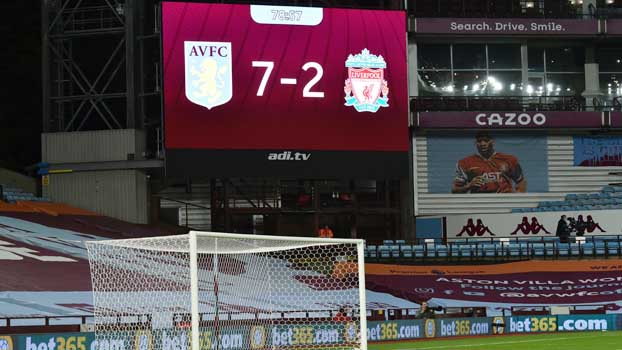Premier League rains goals as stadiums run on empty

When Liverpool began the defence of their Premier League crown with a 4-3 win over promoted Leeds United last month it opened the floodgates for an unprecedented deluge of goals in the opening weeks of the season.
In 38 fixtures the net has bulged 144 times at an average of 3.79 per game, the most prolific opening four weeks of a top-flight season for 60 years.
In the round of matches before the international break, Liverpool conceded seven for the first time since 1973 in a freakish 7-2 drubbing at Aston Villa, hours after Tottenham Hotspur thrashed Manchester United 6-1 at Old Trafford. Data company Gracenote Sports has been crunching the numbers behind the glut of goals and surprisingly found that less, not more, chances are being created.
Gracenote said there have been 22.6 shots per match, 1.5 fewer than the first four rounds last season and the lowest figure for 10 years. Crucially, however, a goal is being scored every six attempts compared to the usual nine or 10.
Logic suggests that either the quality of attacking players has improved or goalkeepers and defences are inferior, the latter scenario supported by the fact that keepers are saving 59% of on-target attempts compared to the 70% they usually keep out and that there is less tackling.
While 23 goals have come from penalties in the first four weeks, a record, Simon Gleave, head of sports analysis at Nielsen’s Gracenote, said that does not explain the rise.
“The current goal rush is built on a stunning increase in the conversion of opportunities,” he said.
“Shots from all over the pitch are being scored more often than expected. Defenders and goalkeepers are conceding more frequently than the data suggests they ought to.” So is the fact that matches are taking place in empty stadiums because of the COVID-19 pandemic triggering the goal spree? Matthew Shaw, a performance psychologist for London-based InnerDrive, says the odd match-day atmosphere could certainly be a factor in helping strikers be more clinical, allowing them to score with the freedom they show on the training ground.
“One reason things normally go better on the training ground than on the pitch is that there are less consequences on the practise pitch,” Shaw told Reuters.
“Fear of failure, missing a chance for example when one-on-one with the keeper, can make responses less automatic. With a crowd in the stadium a player will be more aware of the repercussions of missing that chance.




